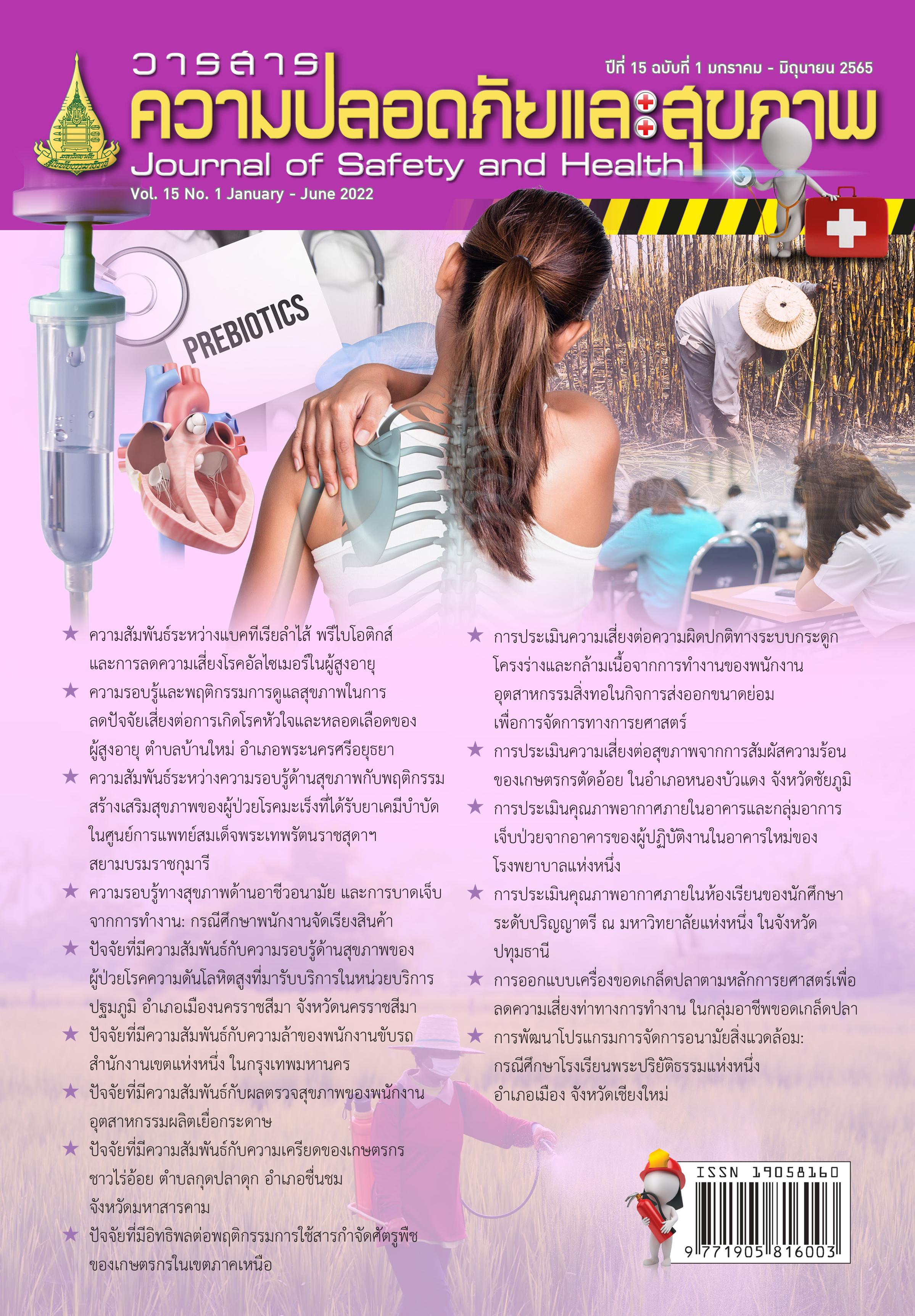ความสัมพันธ์ระหว่างแบคทีเรียลำไส้พรีไบโอติกส์และการลดความเสี่ยงโรคอัลไซเมอร์ในผู้สูงอายุ
Main Article Content
บทคัดย่อ
การเปลี่ยนแปลงขององค์ประกอบของจุลินทรีย์ที่ไม่สมดุลในลำไส้ของผู้สูงอายุสามารถพัฒนาให้เกิดโรคอัลไซเมอร์จากความสัมพันธ์ระหว่างสมองและลำไส้ที่มีการสื่อสารแบบสองทิศทาง โดยแบคทีเรียบางกลุ่มที่พบในลำไส้สามารถผลิตสารเมแทบอไลต์ที่เป็นพิษต่อเซลล์ประสาท ส่งผลทำให้เกิดการอักเสบและการตายของเซลล์ประสาทในระบบประสาทส่วนกลางผ่านวิถีหรือช่องทางต่างๆ อาหารเป็นปัจจัยสำคัญที่ส่งผลต่อการเปลี่ยนแปลงองค์ประกอบของแบคทีเรียในลำไส้ การบริโภคอาหารกลุ่มพรีไบโอติกส์หรือใยอาหารจากผัก ผลไม้ และธัญพืชสามารถกระตุ้นแบคทีเรียที่ผลิตกรดไขมันสายสั้นหรือจุลินทรีย์กลุ่มโพรไบโอติกส์ โดยแบคทีเรียดังกล่าวสามารถผลิตสารเมแทบอไลต์ต่อต้านการอักเสบและลดการผ่านเข้าไปของสารเมแทบอไลต์ที่เป็นพิษต่อเซลล์ประสาท ดังนั้น ความเข้าใจเกี่ยวกับความสัมพันธ์ระหว่างแบคทีเรียในลำไส้ พรีไบโอติกส์และการเกิดโรคอัลไซเมอร์อาจเป็นแนวทางในการช่วยป้องกันความเสี่ยงการเกิดของโรคอัลไซเมอร์ที่มีสาเหตุจากความไม่สมดุลของจุลินทรีย์ในผู้สูงอายุได้
Article Details

อนุญาตภายใต้เงื่อนไข Creative Commons Attribution-NonCommercial-NoDerivatives 4.0 International License.
Journal of Safety and Health is licensed under a Creative Commons Attribution-NonCommercial-NoDerivatives 4.0 International (CC BY-NC-ND 4.0) licence, unless otherwise stated.
เอกสารอ้างอิง
ก้องเกียรติ กูณฑ์กันทรากร. (2561). ภาวะสมองเสื่อมและโรคอัลไซเมอร์. ธรรมศาสตร์เวชสาร, 18(3), 442-468.
วิชัย เอกพลากร.(2557). รายงานการสำรวจสุขภาพประชาชนโดยการตรวจร่างกาย ครั้งที่ 5 พ.ศ. 2557.นนทบุรี:สถาบันวิจัยระบบสาธารณสุข.
สำนักงานสถิติแห่งชาติ.(2561). รายงานการสำรวจประชากรสูงอายุในประเทศไทย พ.ศ.2560
อัญชลี ศรีจำเริญ.(2561). อาหารและโภชนาการ การป้องกันกลไกบกพร่อง.กรุงเทพมหานคร: สำนักพิมพ์แห่งจุฬาลงกรณ์มหาวิทยาลัย.
Carabotti, M., Scirocco, A., Maselli, M.A. , & Severi, C. (2015). The gut-brain axis: interactions between enteric microbiota, central and enteric nervous systems. Annals of Gastroenterology. 28(2), 203-209.
Conte, C., Sichetti, M.,& Traina, G. (2020). Gut–Brain Axis: Focus on neurodegeneration and mast cells. Applied Sciences. 10 (1828), 2-19.
Dalile, B., Oudenhove, L.V., Vervliet, B., & Verbeke, K. (2019). The role of short- chain Fatty acids in microbiota–gut–brain communication. Nature Reviews gastroenterology & hepatology. 16 (2019): 461-478.
Dinan, T.G., Stilling, R.M., Stanton, T., & Cryan, J.F. (2015). Collective unconscious: How gut microbes shape human behavior. Journal of Psychiatric Research. 63(2015), 1-9.
Feng, W., Ao, H., & Peng, C. (2018). Gut microbiota, Short-chain fatty acids, and herbal medicines. Frontiers in pharmacology. 9(2018), 1-12.
Kowalski, K., & Mulak, A. (2019). Brain-gut microbiota axis in Alzheimer’s disease. Journal of neurogastroenterol Motil. 25(1), 48-60.
Martínez Leo, E.E., & Segura Campos, M.R. (2020). Effect of ultra-processed diet on gut microbiota and thus its role in neurodegenerative diseases. Nutrition. 71(2020), 1-7.
Long, J.M., & Holtzman, D.M. (2019). Alzheimer Disease: An Update on Pathobiology and Treatment Strategies. Cell. 179(2), 312-339.
Parker, A., Fonseca, S., & Carding, S.R. (2020). Gut microbes and metabolites as modulators of blood-brain barrier integrity and brain health. Gut Microbes. 11(2), 135–157.
Rinninella, E., Raoul, P., Cintoni, M., Franceschi, F., Miggiano, G.A.D., Gasbarrini, A., & Mele, M.C. (2019). What is the Healthy Gut Microbiota Composition? A Changing Ecosystem across Age, Environment, Diet, and Diseases. Microorganisms. 7(14), 17-22.
Rothschild, D., Weissbrod, O., Barkan, E., et al. (2018). Environment dominates over host genetics in shaping human gut microbiota. Nature. 555, 210–215.
Sarkar, S.R., & Banerjee, S. (2019). Gut microbiota in neurodegenerative disorders. Journal of Neuroimmunology. 328 (2019), 98–104.
Silva, Y.P., Bernardi, A., & Luiz, R. (2020). The role of short-chain fatty acids from gut microbiota in gut-brain communication. Frontiers endocrinology. 11(2020), 1-14.
Thursby, E., & Juge, N.(2017). Introduction to the human gut microbiota. Biochemical Journal. 474(11), 1823–1836.
Vinolo, M.A.R., Rodrigues, H.G., Nachbar, R.T., & Curi, R. (2011). Regulation of inflammation by short chain fatty acids. Nutrients. 3(10), 858-876.
Westfall, S., Lomis, N., Kahouli, I., Dia, S.Y., Singh, S.P., & Prakash, S. (2017). Microbiome, probiotic and neurodegenerative diseases deciphering the gut brain axis. Cellular and Molecular Life Sciences. 2017 (74), 3769-3787.
Wu, W., Kong, Q., Tian, P., Zhai, Q., Wang, G., Liu, X., Zhao, J., Zhang, H., Lee, Y.K., & Chen, W. (2020). Targeting Gut Microbiota Dysbiosis: Potential Intervention Strategies for Neurological Disorders. Engineering. 6(4), 415-423.
Zhao, Y., Jaber, V., & Lukiw, W.J. (2017). Secretory products of the human GI tract microbiome and their potential impact on Alzheimer's disease (AD): Detection of lipopolysaccharide (LPS) in AD hippocampus. Front Cellular and Infection Microbiology. 7(318): 1-9.


